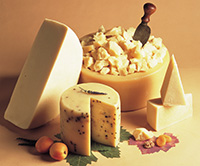Congressional Leaders Question Process for Changing System that Protects Food Names
March 9, 2015
 House and Senate leaders overseeing trade and intellectual property issues expressed serious doubts about European efforts to shut the U.S. out of discussions on efforts to revise a global system for registering protected food names.
House and Senate leaders overseeing trade and intellectual property issues expressed serious doubts about European efforts to shut the U.S. out of discussions on efforts to revise a global system for registering protected food names.
The planned changes to a treaty known as the Lisbon Agreement could severely restrict the use of many cheese names by marketers in countries that, like the United States, are not even signed on to the agreement.
Changes that would expand the scope of the agreement are scheduled to be considered at a 10-day international conference in May. But, under newly implemented rules, non-parties to the treaty are not allowed to participate fully, even though their food producers could be impacted enormously by the changes.
Only the parties to the actual agreement – about 30 nations, roughly half of them in Europe – can fully participate in the conference.
In a bipartisan letter, Senators Orrin Hatch (R-UT), Ron Wyden (D-OR), Chuck Grassley (R-IA) and Patrick Leahy (D-VT) and Representatives Paul Ryan (R-WI), Sandy Levin (D-MI), Bob Goodlatte (R-VA) and John Conyers (D-MI) urged the World Intellectual Property Organization to follow past practice by letting all WIPO-member countries have an equal voice in determining changes to the Lisbon Agreement.
Hatch, Wyden, Ryan and Levin head the Senate Finance and House Ways and Means committees, while Grassley, Leahy, Goodlatte and Conyers oversee both chambers’ judiciary committees.
Dairy leaders praised the House and Senate members for questioning WIPO’s process.
“The proposed changes in the Lisbon Agreement are clearly aimed at preventing U.S. dairy producers from using names in international trade that they have used for decades, such as feta, parmesan, havarti, asiago and others,” said Jim Mulhern, NMPF President and CEO. “Countries can strike treaties to address their own goals, but that should not be allowed to come at the expense of others’ long-standing and growing exports.”
NMPF has helped lead U.S. dairy interests in opposing European efforts to ban countries from using many common cheese names unless the products are made in a particular geographic area.






